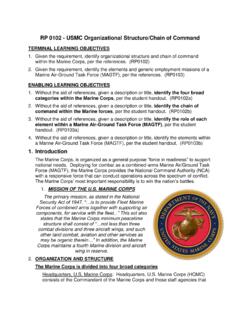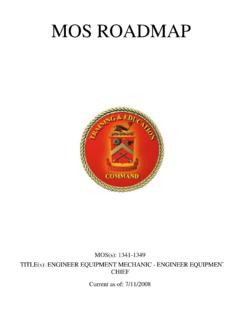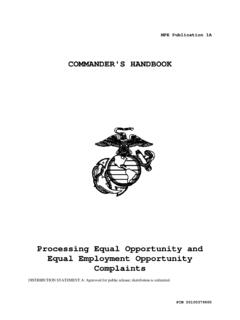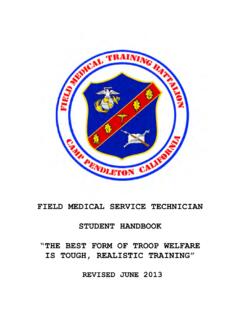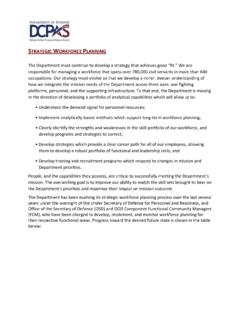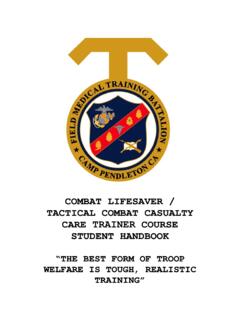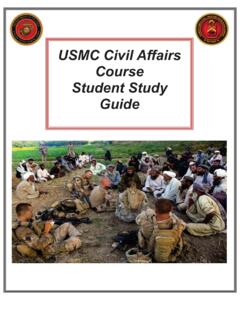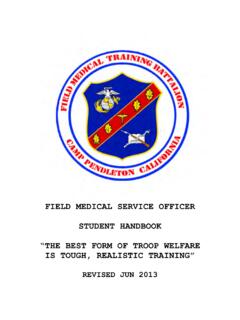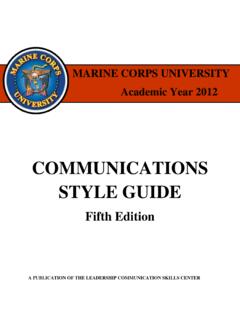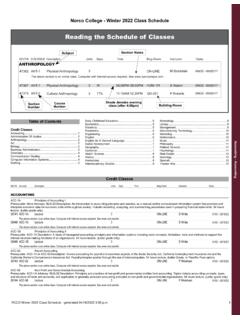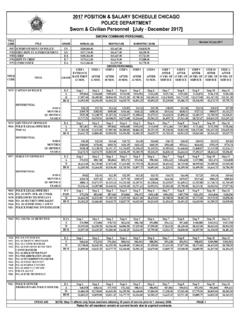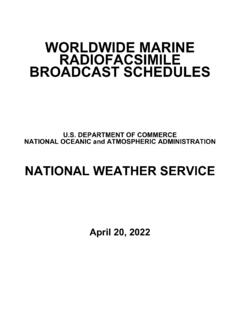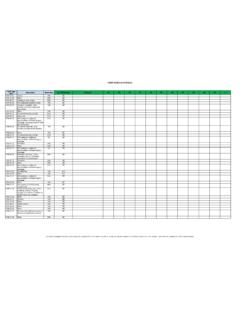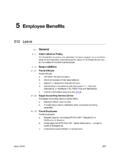Transcription of RP 0103 - Principles of Marine Corps Leadership
1 RP 0103 - Principles of Marine Corps Leadership TERMINAL LEARNING OBJECTIVES 1. In a military environment, identify the Leadership traits and Principles of the Marine Corps , per the reference. (RP0103) ENABLING LEARNING OBJECTIVES 1. Without the aid of references, given a description or title, identify the Leadership trait, per the student handout. (RP0103a) 2. Without the aid of references, given a description or title, identify the Leadership principle, per the student handout. (RP0103) 1. INTRODUCTION Leadership is intangible, hard to measure, and difficult to describe. It's quality would seem to stem from many factors. But certainly they must include a measure of inherent ability to control and direct, self-confidence based on expert knowledge, initiative, loyalty, pride and sense of responsibility. Inherent ability cannot be instilled, but that which is latent or dormant can be developed.
2 Other ingredients can be acquired. They are not easily learned. But leaders can be and are made. General C. B. Cates, 19th Commandant of the Marine Corps Lt. Gen. Lewis Chesty Puller Lt. Gen. Puller steadily worked his way up the ranks proving his outstanding Leadership qualities. He received a direct commission and began collecting awards for valor. By the time he retired from the Marine Corps in 1951 he had earned more awards than any Marine in history; five Navy Crosses, the Distinguished Service Cross, the Silver Star, two Legions of Merit with V device, the Bronze star with V device, the Bronze Star, the Air Medal and the Purple Heart. The traits and Principles of Leadership are the basic fundamentals that marines use to develop their own Leadership abilities and that of their subordinates. There are 14 Leadership traits and 11 Leadership Principles listed in this lesson.
3 2. 14 Leadership Traits The fourteen Leadership traits can be remembered with the acronym JJ-DIDTIEBUCKLE: - Justice - Judgment - Dependability - Initiative - Decisiveness - Tact - Integrity - Enthusiasm - Bearing - Unselfishness - Courage - Knowledge - Loyalty - Endurance Justice Definition - Giving reward and punishment according to the merits of the case in question. The ability to administer a system of rewards and punishments impartially and consistently. Significance - The quality of displaying fairness and impartiality is critical in order to gain the trust and respect of subordinates and maintains discipline and unit cohesion, particularly in the exercise of responsibility. Example - Fair apportionment of tasks by a squad leader during field day. Judgment Definition - The ability to weigh facts and possible courses of action in order to make sound decisions.
4 Significance - Sound judgment allows a leader to make appropriate decisions in the guidance and training of his/her marines and the employment of his/her unit. A Marine who exercises good judgment weighs pros and cons accordingly when making appropriate decisions. Example - A Marine properly apportions his/her liberty time in order to relax as well as to study. Dependability Definition - The certainty of proper performance of duty. Significance - The quality that permits a senior to assign a task to a junior with the understanding that it will be accomplished with minimum supervision. Example - The squad leader ensures that his/her squad falls out in the proper uniform without having been told to by the platoon sergeant. Initiative Definition - Taking action in the absence of orders. Significance - Since an NCO often works without close supervision; emphasis is placed on being a self-starter.
5 Initiative is a founding principle of Marine Corps Warfighting philosophy. Example - In the unexplained absence of the platoon sergeant, an NCO takes charge of the platoon and carries out the training schedule . Decisiveness Definition - Ability to make decisions promptly and to announce them in a clear, forceful manner. Significance - The quality of character which guides a person to accumulate all available facts in a circumstance, weigh the facts, and choose and announce an alternative which seems best. It is often better that a decision be made promptly than a potentially better one be made at the expense of more time. Example - A leader, who sees a potentially dangerous situation developing, immediately takes action to prevent injury from occurring. Tact Definition - The ability to deal with others in a manner that will maintain good relations and avoid offense.
6 More simply stated, tact is the ability to say and do the right thing at the right time. Significance - The quality of consistently treating peers, seniors, and subordinates with respect and courtesy is a sign of maturity. Tact allows commands, guidance, and opinions to be expressed in a constructive and beneficial manner. This deference must be extended under all conditions regardless of true feelings. Example - A Marine discreetly points out a mistake in drill to an NCO by waiting until after the unit has been dismissed and privately asking which of the two methods are correct. Integrity Definition - Uprightness of character and soundness of moral Principles . The quality of truthfulness and honesty. Significance - A Marine s word is his/her bond. Nothing less than complete honesty in all of your dealings with subordinates, peers, and superiors is acceptable.
7 Example - A Marine who uses the correct technique on the obstacle course, even when he/she cannot be seen by the evaluator. Enthusiasm Definition - The display of sincere interest and exuberance in the performance of duty. Significance - Displaying interest in a task and optimism that can be successfully completed greatly enhances the likelihood that the task will be successfully completed. Example - A Marine who leads a chant or offers to help carry a load that is giving someone great difficulty while on a hike despite being physically tired, he encourages his fellow marines to persevere. Bearing Definition - Creating a favorable impression in carriage, appearance, and personal conduct at all times. Significance - The ability to look, talk, and act like a leader whether or not these manifestations indicate one s true feelings. Example - Wearing clean uniforms, boots, and collar devices.
8 Avoiding profane and vulgar language. Keeping a trim, fit appearance. Unselfishness Definition - Avoidance of providing for one s own comfort and personal advancement at the expense of others. Significance - The quality of looking out for the needs of your subordinates before your own is the essence of Leadership . This quality is not to be confused with putting these matters ahead of the accomplishment of the mission. Example - An NCO ensures all members of his unit have eaten before he does, or if water is scarce, he will share what he has and ensure that others do the same. Courage Definition - Courage is a mental quality that recognizes fear of danger or criticism, but enables a Marine to proceed in the face of danger with calmness and firmness. Significance - Knowing and standing for what is right, even in the face of popular disfavor. The business of fighting and winning wars is a dangerous one; the importance of courage on the battlefield is obvious.
9 Example - Accepting criticism for making subordinates field day for an extra hour to get the job done correctly. Knowledge Definition - Understanding of a science or an art. The range of one s information, including professional knowledge and understanding of your marines . Significance - The gaining and retention of current developments in military and naval science and world affairs is important for your growth and development. Example - The Marine who not only knows how to maintain and operate his assigned weapon, but also knows how to use the other weapons and equipment in the unit. Loyalty Definition - The quality of faithfulness to country, Corps , unit, seniors, subordinates and peers. Significance - The motto of the Marine Corps is Semper Fidelis, Always Faithful. You owe unswerving loyalty up and down the chain of command. Example - A Marine displaying enthusiasm in carrying out an order of a senior, though he may privately disagree with it.
10 Endurance Definition - The mental and physical stamina measured by the ability to withstand pain, fatigue, stress, and hardship. Significance - The quality of withstanding pain during a conditioning hike in order to improve stamina is crucial in the development of Leadership . Leaders are responsible for leading their units in physical endeavors and for motivating them as well. Example - A Marine keeping up on a 10-mile forced march even though he/she has blisters on both feet. 3. 11 Leadership Principles Know Yourself and Seek Self Improvement - This principle of Leadership should be developed by the use of Leadership traits. Evaluate yourself by using the Leadership traits and determine your strengths and weaknesses. - You can improve yourself in many ways. To develop the techniques of this principle: - Make an honest evaluation of yourself to determine your strong and weak personal qualities - Seek the honest opinions of your friends or superiors - Learn by studying the causes for the success and failures of others - Develop a genuine interest in people - Master the art of effective writing and speech - Have a definite plan to achieve your goal Be Technically And Tactically Proficient - A person who knows their job thoroughly and possesses a wide field of knowledge.
